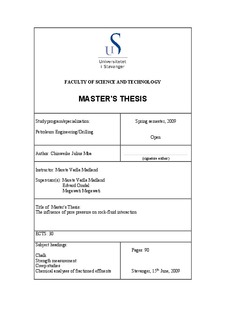| dc.contributor.author | Mba, Chinweike Julius | |
| dc.date.accessioned | 2012-05-23T11:04:53Z | |
| dc.date.available | 2012-05-23T11:04:53Z | |
| dc.date.issued | 2009 | |
| dc.identifier.uri | http://hdl.handle.net/11250/183404 | |
| dc.description | Master's thesis in Petroleum engineering | no_NO |
| dc.description.abstract | The experimental work in this thesis was performed at the chalk laboratory in
University of Stavanger. The main objective is to determine the overall influence of
pore pressure on the mechanical strength of chalk in the presence simple brines,
mainly MgCl2 and NaCl with the same ionic strength as in seawater. The tests were
carried out at both high and low pore pressures of 40MPa and 0.7MPa respectively.
The temperature used during the performance of all the tests was 130oC.
The chalk samples used in the experiments were from Stevns Klint near Copenhagen
in Denmark. Generally the chalk has very high porosity and low content of silica,
which confers on it a low mechanical strength.
Each of the samples tested at high pore pressures undergoes four main stages while
those carried out at low pressures have three phases. The first phase involves initial
building of confining and pore pressures to 1.4MPa and 0.7MPa respectively while
cleaning the samples with distilled water. Ramping of confining and pore pressures
simultaneously to 41MPa and 40MPa respectively, followed by brine injection is
carried out in the second phase. The third phase is hydrostatic loading of the samples
to an effective stress of 12MPa, followed by the creep phase and sampling of effluents
of the flooded brine. The last stage entails chemical analyses of the fractioned
effluents using Ion Chromatography machine. Tests performed at low pressures does
not involve the second phase of pressure ramping.
Several problems were encountered during the tests because of the high pressure and
high temperature conditions of the tests. Among the tests performed, 6 were accepted
as successful, 2 were partially successful while 11 were adjudged as unsuccessful.
Results from the experiments reveal that chalk cores flooded with NaCl are
mechanically weaker than those injected with MgCl2 at both high and low pressures.
Suggested possible reason for the difference in mechanical strength was that there was
dissolution of the chalk and a subsequent precipitation of minerals for cores flooded
with MgCl2. The precipitates tend to increase cementation and friction between the
chalk grains, making them mechanically stronger. For cores injected with NaCl it was
believed that precipitates were not formed which resulted in enhanced compaction
taking place. In addition, “accelerating-like” creep was observed on chalk cores
exposed to MgCl2 at high pressures but no such creep trend was observed on the rest
samples subjected to other test conditions. Accelerating creep has not been reported in
previous experiments on chalk. | no_NO |
| dc.language.iso | eng | no_NO |
| dc.publisher | University of Stavanger, Norway | no_NO |
| dc.relation.ispartofseries | Masteroppgave/UIS-TN-IPT/2009; | |
| dc.subject | petroleumsteknologi | no_NO |
| dc.subject | chalk | no_NO |
| dc.subject | boreteknologi | no_NO |
| dc.subject | creep studies | no_NO |
| dc.subject | strenght measurement | no_NO |
| dc.subject | fractioned effluents | no_NO |
| dc.title | The influence of pore pressure on rock-fluid interaction | no_NO |
| dc.type | Master thesis | no_NO |
| dc.subject.nsi | VDP::Technology: 500::Rock and petroleum disciplines: 510 | no_NO |
